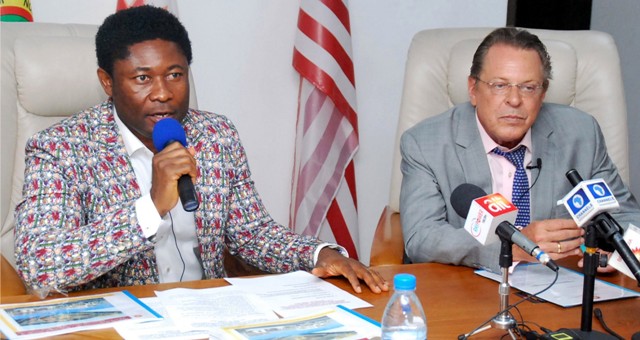Business
Establish Business Liaison Office In Rivers, Belemaoil Urges US

In a bid to strengthen existing relationship and create more value for mutual benefits through collaboration between Nigeria and the United States of America, a leading indigenous oil company in the Niger Delta, Belemaoil Producing Ltd, has appealed to the US Commercial Department to establish a Business Liaison Office in Port Harcourt the Rivers State capital.
Founder/President of Belemaoil Producing Ltd, Mr Jack-Rich Tein Jr., made the appeal when the US Consul-General to Nigeria, Mr. John Bray paid a courtesy visit to the company. Speaking, while making a presentation of Belemaoil’s roadmap and vision during the visit at the company’s headquarters in Port Harcourt the Rivers State capital, yesterday, Mr. Tein Jr, stated that Port Harcourt is West Africa’s economic hub for oil and gas investment which operates over 85% of Nigeria’s economy.
He particularly, pointed out that establishing a business liaison office in Port Harcourt will enhance technical partnerships, procurement of equipment, materials and spare parts, acquisition of state-of-the-art technology, support home economy, and other bilateral relationships with Rivers State and Federal Government of Nigeria.
Mr Tein Jr., described the visit as very important to the company and expressed confidence that the US Consulate will heed to the appeal to establish a Business Liaison Office in Port Harcourt.
“What we have displayed here today is an appeal, for the US Department of Commerce which is headed by the Consul-General to have its Business and Liaison Office in Port Harcourt as a strategic business footprint in the Niger Delta.
“We want the US Department of Commerce to actually have a Business Liaison Office here. Port Harcourt being the economic base of West Africa in Oil and Gas, we believe strongly that we have gone a long way and that is why we are appealing to the Department to establish a Business Liaison Office in Port Harcourt that will foster strategic economic growth. The city is the heart of the Niger Delta and Nigeria’s Treasure Base and therefore such commercial presence will greatly foster economic and diplomatic cohesion,” he said.
Mr Tein Jr. told the visiting Consul-General that Belemaoil’s Model is aimed at making sure that the local communities where the company operates are developed in such manner that they build competencies in terms of technical support and trainings so that they too can achieve their lifetime dreams like Belemaoil.
He stated that Belemaoil Producing Ltd, which is the first indigenous oil company to emanate from an oil producing community in the whole of Africa, aims to create no fewer than 3,000 direct jobs in the near future.
He also stated that the Federal Government of Nigeria has benefitted in terms of peace and order with increased regional youth employment, investment friendly climate for other injectors/investors based on investment friendly environment maintained by Host Communities, increase in crude oil production and revenue through the Belemaoil Model.
Also fielding questions from newsmen shortly after the presentation, Tein Jr, further expressed willingness to help in promoting peace in Rivers State and the Niger Delta in order to create confidence in the US Department of Commerce for the establishment of the Business Liaison Office in Port Harcourt.
Speaking, the US Consul-General in Nigeria, Mr. John Bray, expressed happiness with the steps taken by Belemaoil Producing Ltd to foster peace in Rivers State and the Niger Delta, describing the company as a leading light for other companies.
Mr Bray, however, emphasized on the need for a peaceful election in the state, saying the perception of Rivers State the world over, is that the state has the highest rate of electoral violence.
On her part, an official of the US, Department of Commerce, Jennifer Woods stated that the delegation will look at possible areas where it can partner with Belemaoi and other operators to boost commerce in Rivers State.
Business
Two Federal Agencies Enter Pack On Expansion, Sustainable Electricity In Niger Delta

Business
Why The AI Boom May Extend The Reign Of Natural Gas

Business
Ogun To Join Oil-Producing States ……..As NNPCL Kicks Off Commercial Oil Production At Eba

-

 Sports3 days ago
Sports3 days ago2026 WC: Nigeria, DR Congo Awaits FIFA Verdict Today
-

 Environment3 days ago
Environment3 days agoOxfam, partners celebrate 5 years of climate governance programmes in Nigeria
-
Politics3 days ago
ADC, PDP, LP Missing As INEC Set For By- Elections In Rivers
-
Politics3 days ago
FG’s Economic Policies Not Working – APC Chieftain
-

 Politics3 days ago
Politics3 days ago2027: Diri Unveils RHA LG Coordinators, APC Congress Panel
-

 Politics3 days ago
Politics3 days agoReps To Meet,’Morrow Over INEC’s 2027 Election Timetable
-

 Politics3 days ago
Politics3 days agoGroup Continues Push For Real Time Election Results Transmission
-
Sports3 days ago
Sunderland Overcome Oxford Challenge

